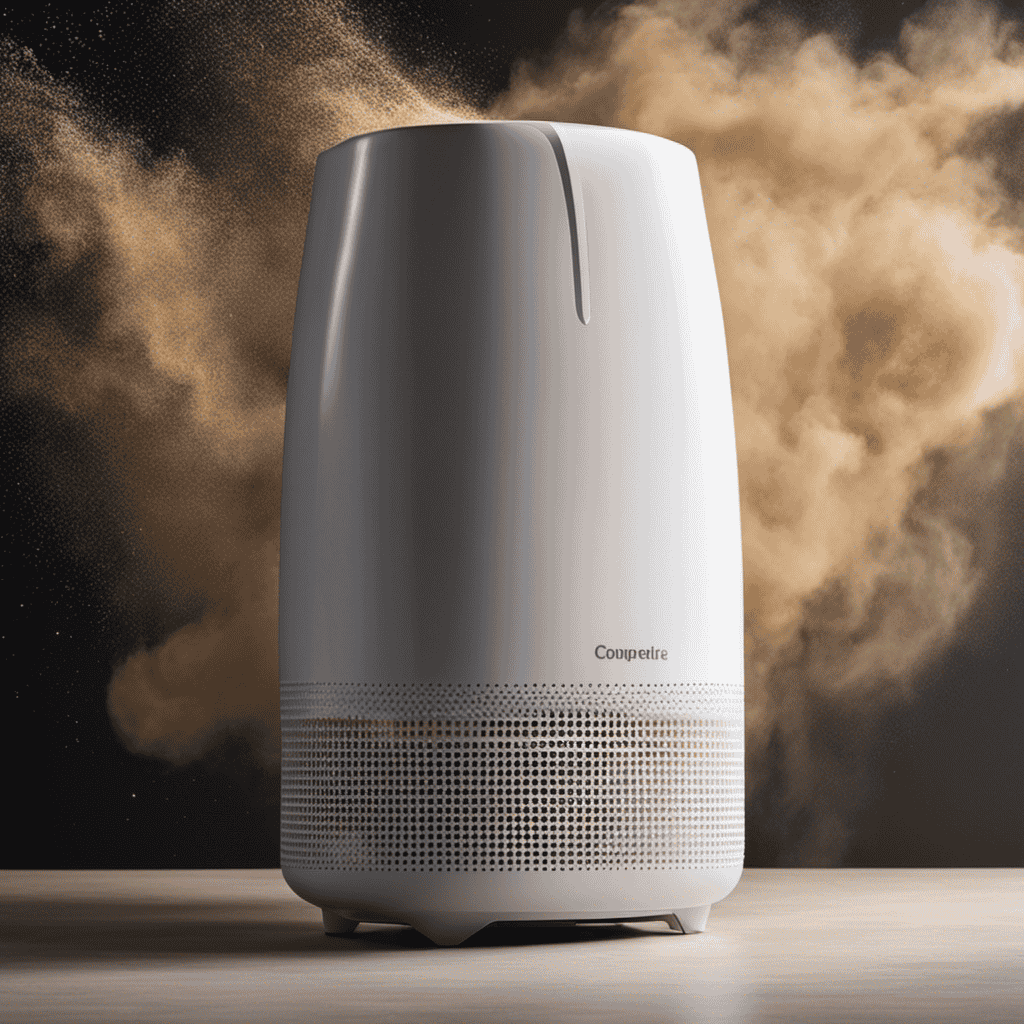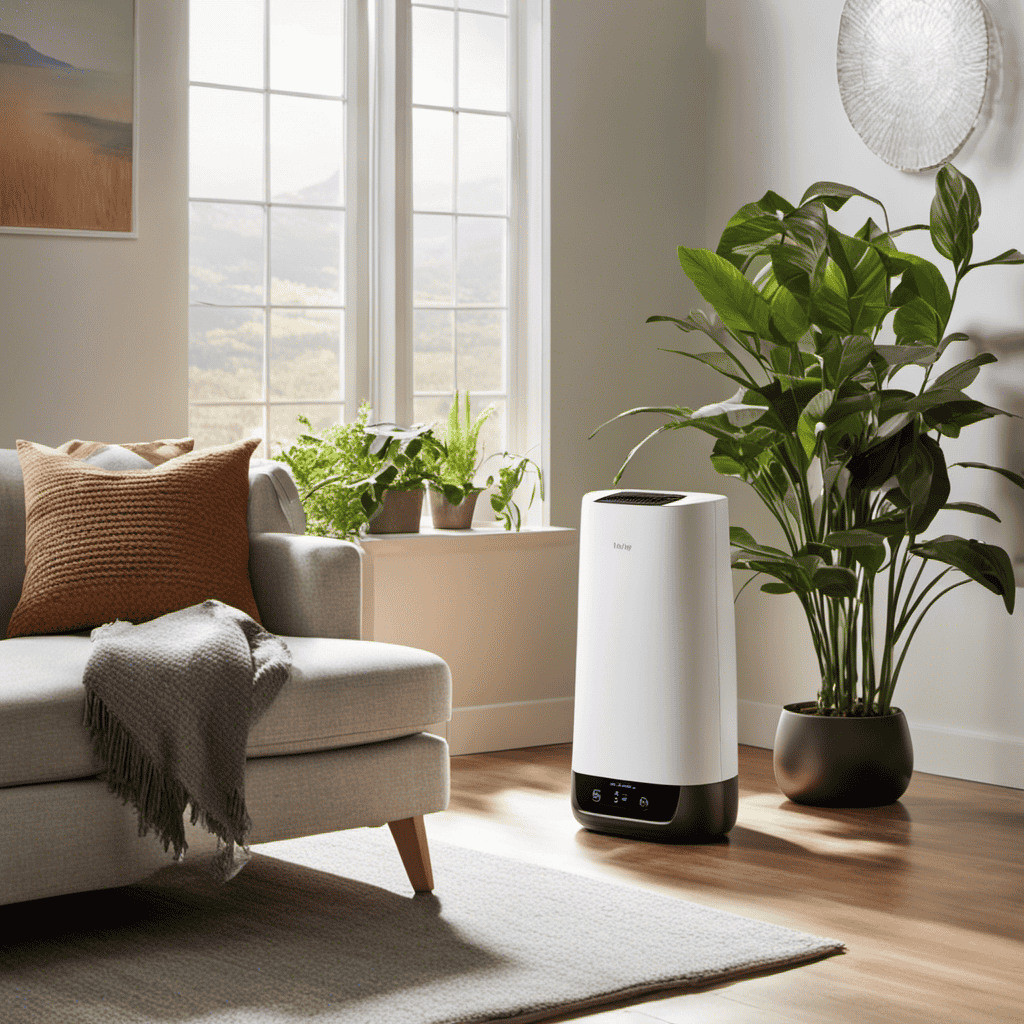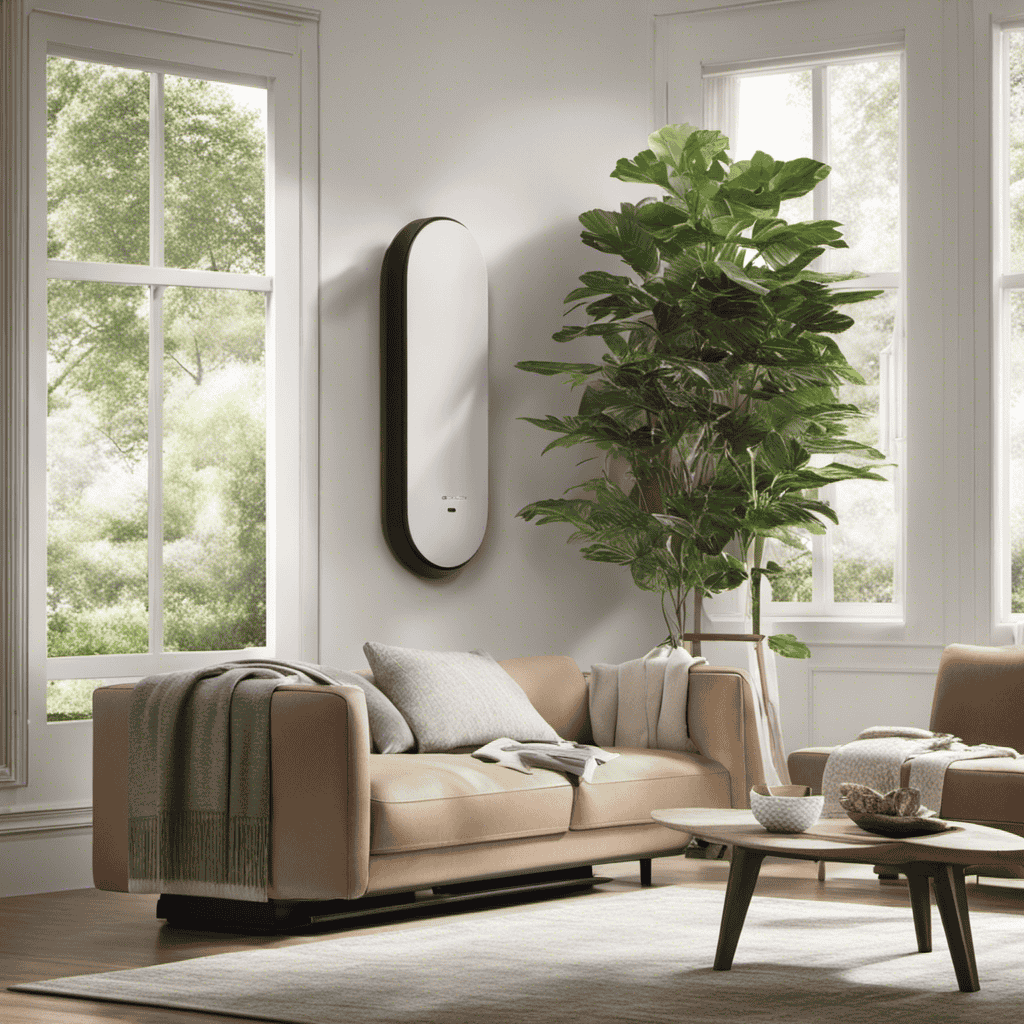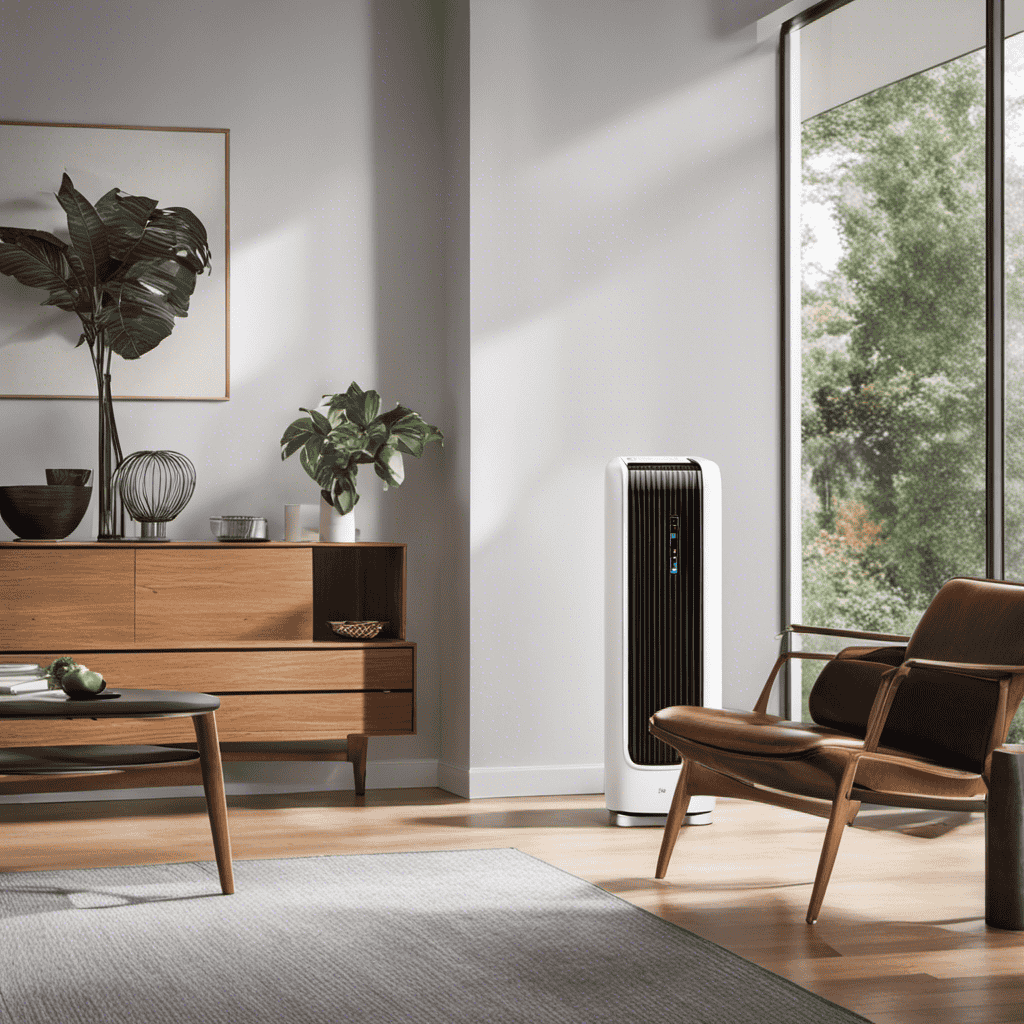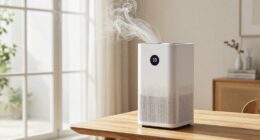As a fan of air purifiers, I have encountered many unpleasant smells, but one that consistently grabs my attention is that sour odor. It’s like a persistent cloud of unease that permeates the air.
But why does it happen? In this article, we’ll delve into the common causes of that sour smell in air purifiers. From mold and mildew to bacterial growth and dirty filters, we’ll explore the factors that contribute to this unappealing scent.
And fear not, I’ll also share some tips to prevent and eliminate these odors once and for all.
So, let’s dive in and clear the air!
Key Takeaways
- Sour smells in air purifiers can be caused by bacteria, mold, and VOCs, as well as lack of cleaning and maintenance.
- These sour smells can lead to decreased air quality, unpleasant odors, and potential health issues.
- Cleaning and maintenance methods such as using vinegar and water solution, spraying and rinsing filters, and allowing them to air dry can help eliminate sour smells.
- Prevention tips include regular cleaning, keeping the air purifier in a well-ventilated area, controlling humidity levels, and using air purifiers with activated carbon filters.
Common Causes of a Sour Smell in Air Purifiers
One of the most common causes of a sour smell in air purifiers is the accumulation of bacteria and mold. When air purifiers are not properly maintained, they can become a breeding ground for these microorganisms. Bacteria and mold thrive in warm and moist environments, which are often present in air purifiers that are not regularly cleaned. These microorganisms release volatile organic compounds (VOCs) that contribute to the unpleasant odor.
To prevent this odor and maintain air quality, it is crucial to regularly clean and disinfect the air purifier. This involves removing and cleaning the filters, wiping down the interior surfaces, and ensuring proper ventilation. By taking these preventative measures, you can effectively eliminate the accumulation of bacteria and mold, thus preventing the sour smell in your air purifier.
Moving on to how mold and mildew can cause a sour odor in air purifiers…
How Mold and Mildew Can Cause a Sour Odor in Air Purifiers
Mold and mildew can cause a sour odor in air purifiers. These fungi thrive in warm and humid conditions, making air purifiers an ideal environment for their growth.
Mold spores can enter the purifier through the intake and start spreading inside, leading to a musty smell. Mildew, on the other hand, is a specific type of mold that usually grows on damp surfaces. If there is excess moisture in your air purifier, it can promote mildew growth, resulting in a sour odor.
To prevent mold and mildew, it is essential to keep your air purifier clean and dry. Regularly clean and replace filters, empty water tanks, and ensure proper ventilation. If you notice any signs of mold or mildew, such as black spots or a foul smell, it is crucial to remove them immediately.
Use a mixture of water and vinegar or a mild detergent to clean the affected areas thoroughly.
Bacterial Growth and Its Effects on Air Purifier Smell
To prevent bacteria from causing unpleasant odors in your air purifier, make sure to regularly clean and disinfect the unit. Bacterial growth can occur in air purifiers if they are not properly maintained, leading to foul smells and potentially compromising the quality of the air you breathe.
Here are some recommended air purifier maintenance practices to prevent bacterial growth and keep your unit smelling fresh:
- Clean the pre-filter and HEPA filter regularly to remove dust, pollen, and other particles that can contribute to bacterial growth.
- Use a mild disinfectant solution to clean the surfaces of the air purifier, including the fan blades and vents.
- Avoid placing the air purifier in damp or humid areas, as this can create an environment conducive to bacterial growth.
- Keep the air purifier in a well-ventilated area to promote air circulation and prevent stagnant air, which can contribute to bacterial growth.
The Role of Dirty Filters in Producing a Sour Smell in Air Purifiers
Dirty filters in air purifiers can produce a sour smell if they are not regularly cleaned or replaced. This is because the filters serve as a trap for dust, pollen, pet dander, and other airborne particles. Over time, these particles accumulate and can become a breeding ground for bacteria, mold, and mildew. As these microorganisms thrive in the warm and damp environment of a dirty filter, they release volatile organic compounds (VOCs) that contribute to the sour smell.
In addition to the unpleasant odor, dirty filters can also reduce the effectiveness of the air purifier, as they become clogged and hinder the airflow. Regular maintenance of air purifiers, including cleaning or replacing the filters, is essential to ensure optimal performance and prevent the buildup of foul odors.
Chemical Contamination and Its Impact on Air Purifier Odor
As an expert in air purifiers, I’ve encountered many cases where chemical contamination has led to unpleasant odors.
Common chemical contaminants that can contribute to these odors include formaldehyde, volatile organic compounds (VOCs), and ozone.
To eliminate these odors, it’s important to use air purifiers with activated carbon filters. These filters are effective in absorbing and neutralizing these chemical compounds.
Common Chemical Contaminants
Common chemical contaminants can contribute to the sour smell in your air purifier. These contaminants, often found in household products and pollutants, can not only affect the odor but also have detrimental effects on your health. Exposure to these chemicals can lead to various symptoms such as headaches, dizziness, and respiratory issues.
It’s crucial to choose an air purifier that is specifically designed for chemical removal. When selecting an air purifier for this purpose, consider the following factors:
-
Filtration system: Look for a purifier that utilizes activated carbon filters, which are highly effective in trapping and neutralizing chemical pollutants.
-
Air exchange rate: A higher air exchange rate ensures that the purifier can effectively remove and replace the air in your space, reducing the concentration of chemicals.
-
Room size: Choose a purifier that is suitable for the size of the room to ensure optimal air purification.
Solutions for Eliminating Odor
To effectively eliminate odor, consider investing in an air purifier that utilizes activated carbon filters to neutralize chemical pollutants. These filters are highly effective at trapping and removing unpleasant smells, including pet odors. Additionally, there are natural odor neutralizers that can help eliminate unwanted smells in your home. Some popular options include baking soda, vinegar, and activated charcoal. These natural substances work by absorbing and neutralizing odors, leaving your space smelling fresh and clean. Another effective method is using essential oils, which not only provide a pleasant scent but also have antimicrobial properties that can help eliminate bacteria and mold that may be causing the odor. By using a combination of these methods, you can effectively eliminate odor and create a more pleasant living environment.
| Natural Odor Neutralizers | How it Works | Popular Options |
|---|---|---|
| Baking Soda | Absorbs and neutralizes odors | Sprinkle on surfaces |
| Vinegar | Breaks down and eliminates odors | Spray or soak |
| Activated Charcoal | Absorbs and traps odors | Place in containers |
| Essential Oils | Provides pleasant scent and kills odor-causing bacteria | Diffuse or spray |
Tips for Preventing and Eliminating Sour Smells in Air Purifiers
When it comes to dealing with sour smells in air purifiers, it’s important to identify the common odor-causing culprits.
Mold, bacteria, and pet dander are often the main culprits behind these unpleasant odors.
To effectively eliminate these smells, thorough cleaning methods such as using disinfectants and regularly replacing filters can make a significant difference in improving air quality.
Common Odor-Causing Culprits
Have you checked for any potential odor-causing culprits in your air purifier? It’s important to identify the causes of musty odor and the effects of pet dander on your air purifier.
If you haven’t, here are some possible culprits to consider:
- Mold and mildew growth: Excess humidity or water leakage can lead to the growth of mold and mildew, which can cause a musty smell.
- Accumulated pet dander: If you have pets, their dander can accumulate in your air purifier and contribute to unpleasant odors.
These issues can not only affect the air quality in your home but also impact your overall well-being. It’s crucial to address these odor-causing culprits to ensure a clean and fresh environment.
Now, let’s move on to effective cleaning methods to eliminate these odors.
Effective Cleaning Methods
One way to effectively eliminate odors is by using a vinegar and water solution to clean your air purifier. This is one of the most effective cleaning methods for maintaining a fresh-smelling air purifier.
Vinegar is known for its natural deodorizing properties, making it a great option for eliminating unpleasant smells. To clean your air purifier, mix equal parts of vinegar and water in a spray bottle. Gently remove the filters from the purifier and spray them with the vinegar solution.
Let the solution sit for a few minutes to break down any lingering odors. Rinse the filters thoroughly with water and allow them to air dry before reinstalling them. By regularly cleaning your air purifier using this method, you can ensure that it continues to effectively eliminate odors and maintain its optimal performance.
Is a Sour Smell from My Air Purifier a Common Issue?
A sour smell from your air purifier could be due to a variety of causes of air purifier smell, such as a dirty filter, mold or mildew growth, or the presence of volatile organic compounds. Regular cleaning and maintenance can help to prevent and address any unpleasant odors coming from your air purifier.
Frequently Asked Questions
How Often Should I Clean or Replace the Filters in My Air Purifier?
I clean or replace the filters in my air purifier based on the manufacturer’s recommendations. Cleaning frequency and filter replacement depend on factors like the type of filters used and the air quality in my home.
Can Using Scented Air Fresheners or Candles in the Same Room as My Air Purifier Affect Its Performance or Cause a Sour Smell?
Using scented air fresheners or candles in the same room as my air purifier can negatively impact its performance and cause a sour smell. The chemicals from these products can clog the filters and reduce the effectiveness of the air purifier.
Are There Any Specific Air Purifier Brands or Models That Are More Prone to Developing Sour Smells?
Some air purifier brands or models may be more prone to developing sour smells, but regular air purifier maintenance can help prevent this issue. Common causes of sour smells in air purifiers include dirty filters or stagnant water.
Is There a Difference in the Sour Smell Produced by Mold and Mildew Compared to the One Caused by Bacterial Growth?
There is a difference between the sour smell produced by mold and mildew compared to the one caused by bacterial growth. To get rid of the sour smell from your air purifier, try cleaning the filters and disinfecting the unit.
Can Using Essential Oils in My Air Purifier Contribute to the Development of a Sour Odor?
Using essential oils in my air purifier can contribute to a sour odor due to oil residue build-up. To eliminate the smell, clean the purifier regularly and consider using odor-neutralizing products or switching to fragrance-free oils.
Conclusion
In conclusion, understanding the common causes of a sour smell in air purifiers is essential for maintaining a fresh and clean environment.
Mold and mildew, bacterial growth, dirty filters, and chemical contamination can all contribute to this unpleasant odor.
By regularly cleaning and maintaining your air purifier, you can prevent and eliminate these sour smells.
Remember, ‘a stitch in time saves nine,’ so addressing the issue promptly will save you from bigger problems down the road.
Stay proactive and enjoy the benefits of a fresh and healthy indoor atmosphere.
